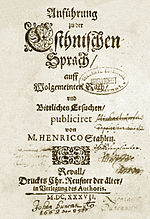An interrogative word or question word is a function word used to ask a question, such as what, which, when, where, who, whom, whose, why, whether and... 12 KB (1,563 words) - 18:17, 5 January 2024 |
An interrogative clause is a clause whose form is typically associated with question-like meanings. For instance, the English sentence "Is Hannah sick... 21 KB (2,832 words) - 02:01, 3 April 2024 |
 | Question (category Interrogative words and phrases) distinguished from interrogatives, which are the grammatical forms typically used to express them. Rhetorical questions, for instance, are interrogative in form... 23 KB (2,961 words) - 13:17, 16 February 2024 |
of interrogative words. It is especially common for a form that otherwise means what to be borrowed as a complementizer, but other interrogative words... 27 KB (3,208 words) - 17:58, 4 April 2024 |
to: How (greeting), a word used in some misrepresentations of Native American/First Nations speech How, an interrogative word in English grammar How... 2 KB (256 words) - 19:33, 12 April 2024 |
the free dictionary. What or WHAT may refer to: What, an English interrogative word "What?", one of the Five Ws used in journalism What! (film) or The... 2 KB (252 words) - 19:45, 19 April 2024 |
English interrogative word which (command), an operating system command Which?, a UK charity and its magazine English relative clauses Interrogative clause... 432 bytes (76 words) - 17:15, 14 November 2023 |
 | The English interrogative words (also known as "wh words" or "wh forms") are words in English with a central role in forming interrogative phrases and... 13 KB (1,596 words) - 02:53, 12 February 2024 |
detail below. All of the interrogative words used in Tagalog are not related to Spanish, with the exception of kumustá. The word kumustá is derived from... 154 KB (8,883 words) - 06:10, 25 April 2024 |
invariable word. Words used as relative pronouns often originally had other functions. For example, the English which is also an interrogative word. This suggests... 7 KB (895 words) - 16:58, 19 March 2024 |
 | English clause syntax (section Interrogative) there? where what is the interrogative word, can is the auxiliary, and you is the subject. In such cases, the interrogative word is said to be fronted,... 40 KB (5,188 words) - 10:11, 2 July 2023 |
English grammar (redirect from English word order) other questions, formed with interrogative words such as where, what, how, etc. An exception applies when the interrogative word is the subject or part of... 87 KB (11,191 words) - 07:03, 11 April 2024 |
Pronoun (section Relative and interrogative) reflexive and reciprocal pronouns, demonstrative pronouns, relative and interrogative pronouns, and indefinite pronouns.: 1–34 The use of pronouns often... 30 KB (3,311 words) - 13:45, 8 April 2024 |
town. In syntactic pied-piping, a focused expression (such as an interrogative word) pulls its host phrase with it when it moves to its new position in... 22 KB (2,876 words) - 13:40, 10 December 2023 |
SV-clauses can also be interrogative or exclamative, however, given the appropriate intonation contour and/or the appearance of a question word, e.g. a. The pig... 23 KB (3,319 words) - 05:18, 18 April 2024 |
Question mark (redirect from Interrogative-point) eroteme in journalism) is a punctuation mark that indicates a question or interrogative clause or phrase in many languages. In the fifth century, Syriac Bible... 34 KB (3,579 words) - 16:53, 24 April 2024 |
pronounced differently from w Pronunciation of English ⟨wh⟩ wh-word, a name for an interrogative word such as where and when wh-movement, a syntactic phenomenon... 1 KB (174 words) - 15:01, 30 November 2022 |
Wh-movement (category Interrogative words and phrases) or wh-raising) is the formation of syntactic dependencies involving interrogative words. An example in English is the dependency formed between what and... 49 KB (7,157 words) - 04:35, 17 February 2024 |
Part of speech (redirect from Closed class word) social standing and respect. Some word classes are universally closed, however, including demonstratives and interrogative words. Part-of-speech tagging Sliding... 31 KB (3,600 words) - 00:48, 24 April 2024 |
VSO in declarative sentences, it always puts interrogative words or phrases first in interrogative word questions; if it has dominant order SOV in declarative... 9 KB (1,246 words) - 18:06, 15 July 2023 |
the wh-cluster, though the spellings reflect the history more; see Interrogative word: Etymology for details. High German consonant shift Glottalic theory... 22 KB (1,687 words) - 11:47, 24 March 2024 |
Pronunciation of English ⟨wh⟩ (category All articles with specifically marked weasel-worded phrases) perceived (and spelt) as beginning with plain /h/. This occurred with the interrogative word how (Proto-Germanic *hwō, Old English hū). A similar process of labialization... 16 KB (1,641 words) - 10:06, 3 March 2024 |
 | Estonian grammar (section Interrogatives) with an interrogative word (interrogative pro-forms or kas (yes/no-question), eks (yes-question), ega (no-question)), followed by the SVO word order (in... 63 KB (6,587 words) - 15:51, 15 February 2024 |
technical terms, and adoptions and adaptations of foreign words. Each function word either: gives grammatical information about other words in a sentence or... 6 KB (698 words) - 03:33, 15 November 2023 |
question focuses on an unknown piece of information, often using an interrogative word (e.g., who, what, when etc.). The corresponding answer provides the... 16 KB (2,326 words) - 21:03, 3 March 2024 |
 | use. An apostrophe was used to mark an interrogative word, and a comma appeared at the end of an interrogative sentence. From the 12th century on, these... 95 KB (6,595 words) - 04:48, 27 April 2024 |



